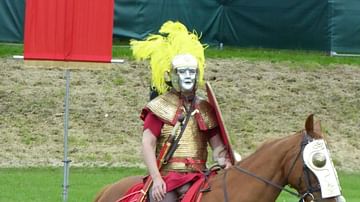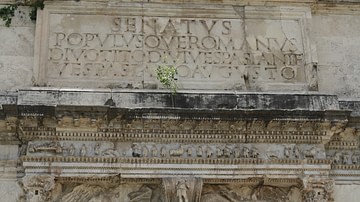Search
Search Results

Definition
Holy Roman Empire
The Holy Roman Empire officially lasted from 962 to 1806. It was one of Europe’s largest medieval and early modern states, but its power base was unstable and continually shifting. The Holy Roman Empire was not a unitary state, but a confederation...

Definition
Roman Cavalry
Cavalry, although never replacing infantry as the mainstay of the Roman army, could provide useful cover on the flanks of armies, could be used as a shock tactic to cause disruption to enemy infantry formations, and could pursue an enemy...

Article
Roman Warfare in the Age of Pyrrhus
The Roman army fought many conflicts throughout its long history, though perhaps none so indelible as the Pyrrhic War from 280 to 275 BCE. This war between Rome and a league of Greek colonies in southern Italy led by the city of Tarentum...

Definition
Roman Auxiliary Cavalry
The Roman army consisted of three separate divisions: the famed legions, the cavalry, and lastly, the auxiliaries. The auxiliaries (auxilia) were comprised of infantry cohorts, mounted infantry, and cavalry units or wings (alae). Although...

Definition
Roman Constitution
Roman constitution was an accumulation of laws, legal decisions, and ancient customs. While today 'constitution' usually refers to a single act of legislation, this was not the case in ancient Rome. Instead, Roman government relied on the...

Article
The Roman Empire in West Africa
At its fullest extent, the Roman Empire stretched from around modern-day Aswan, Egypt at its southernmost point to Great Britain in the north but the influence of the Roman Empire went far beyond even the borders of its provinces as a result...

Definition
Roman Gaul
Roman Gaul is an umbrella term for several Roman provinces in western Europe: Cisalpine Gaul or Gallia Cisalpina, comprised a territory situated in the northernmost part of the Italian peninsula ranging from the Apennines in the west northward...

Article
Roman Citizenship
Citizenship is and always has been a valued possession of any individual. When one studies the majority of ancient empires one finds that the concept of citizenship, in any form, was non-existent. The people in these societies did not and...

Definition
Roman Standard
The Roman Standard (Latin: Signum or Signa Romanum) was a pennant, flag, or banner, suspended or attached to a staff or pole, which identified a Roman legion (infantry) or Equites (cavalry). The Standard of a cavalry unit was emblazoned with...

Article
Legacy of the Ancient Romans
The legacy of the ancient Romans – from both the time of the Roman Republic (509-27 BCE) and the time of the Roman Empire (27 BCE - 476 CE) – exerted a significant influence on succeeding cultures and is still felt around the world in the...